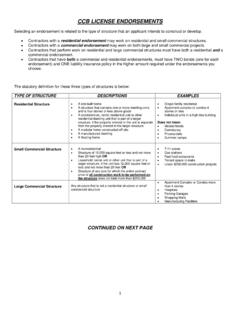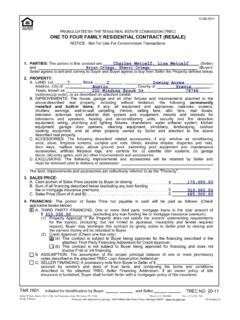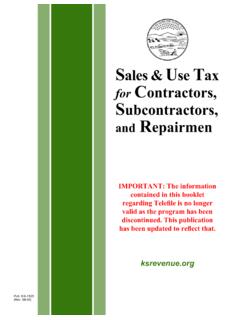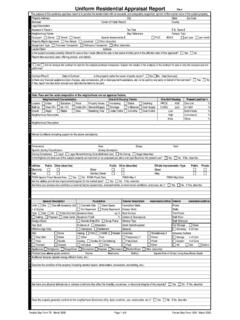Transcription of Sales and Use Tax - Construction Contractors
1 Page | 1 Sales and Use Tax Treatment of Construction Contractors Throughout the States by Dan Davis, MBA (Tax), CPA, CFE Construction : general Rule Although the wording may differ from state to state, a Construction contractor is generally one who converts tangible personal property into real property (land, buildings, or other affixed structures). The contractor does this by substantially attaching the personal property to, or otherwise incorporating the personal property into, the real estate. In most states, the contractor who performs the final act of incorporating tangible personal property into realty is legally regarded as the consumer, or end user, of the installed property. In those states, the tax generally is due on Sales by the supplier to the contractor. In such cases, a contractor who buys tangible personal property with the intention of incorporating it into realty may not issue a resale certificate to the supplier, because the property will not be resold, at least in the form of tangible personal property.
2 Unless the contractor's transfer of the installed property is legally defined as a retail sale, he generally may not charge tax on materials he installs. A handful of states regard Construction Contractors as retail sellers of the materials they install. In California, Colorado, the District of Columbia, Indiana, and Texas, the use of time and materials contracts can cause Contractors to be treated as retailers, whereas they might be taxed as consumers if the same job were performed under another type of contract (such as a lump-sum contract). California considers Contractors to be retailers of fixtures (but not materials) in any case. Wisconsin Contractors are retailers of certain specified items that are considered to remain tangible personal property after installation. If a contract specifically passes title to materials to the customer before installation, the materials portion of the contract may be converted to a retail sale.
3 And in Nebraska, Contractors get to choose whether they will be treated as retailers or consumers. Apart from materials, in several states contractor services (such as installation and/or repairs) are subject to tax. Contractors performing jobs in those states usually must charge and report Sales tax on such services. (Services are further discussed below.) Individual State Differences The following states regard Contractors as retail sellers of installed materials rather than consumers: Arizona, Hawaii, New Mexico and Washington. Various other states follow the general rule ( , Contractors are consumers of tangible personal property they install) for most transactions but make certain types of exceptions. Page | 2 Exceptions by Kinds of Property Installed Virtually all states consider Contractors to be sellers, not consumers, of machinery and equipment they install.
4 Machinery and equipment generally include assets that will be directly used in the customer s primary business operation ( , manufacturing machinery), will retain their identity and function upon installation, and/or will not be substantially affixed to the underlying real estate. Of course, definitions, inclusions, and exclusions vary from state to state. California: Contractors are the consumers of materials they install but are sellers of installed fixtures. Fixtures are items that do not lose their identity upon installation (such as light fixtures or plumbing fixtures) but do not qualify as machinery or equipment. Arkansas: Contractors are the consumers of materials and nonmechanical fixtures they install. Plumbing and lighting fixtures (excluding ceiling fans) are considered nonmechanical for this purpose.
5 Furnishing and installing mechanical/electrical fixtures, such as air conditioning units or elevators, is treated as a retail sale, except for the first-time affixation to the structure. Wisconsin: Designated business fixtures and certain other specific items remain tangible personal property after installation. See Wisconsin Publication 207 for lists of the property involved. Ohio holds a similar theory regarding business fixtures, although it does not necessarily apply to the same items as named by Wisconsin. Exceptions by Form of Contract The form of a contract can have a powerful tax effect in many states. Entering into a lump-sum contract (where the contract calls for a total payment, with no specified breakdown for materials, labor, taxes, etc.) generally does not change the tax outcome from that specified by general state law.
6 However, contracts stipulating amounts for materials, labor and other factors sometimes cause tax to apply to retail selling prices for materials rather than to their cost. In the following states, tax will apply to retail selling prices for materials if such prices are specifically stated in the contract: California: Sales tax applies to amounts separately stated for fixtures. Sales tax also may apply to amounts separately stated for materials, but only if the tax also is separately stated. Colorado: Sales tax is due on retail amounts stated for fixtures and materials in time and materials contracts. Connecticut: Sales tax is due if the contract specifies that the item is sold at an agreed price, and services will be rendered in connection with the sale. This is presumed if the invoice states a charge for the materials, the exact quantities of the materials being sold, and an additional price for the installation.
7 Florida: If the contract itemizes each and every material and fixture, the transaction is treated as a retail sale. Texas: When materials and fixtures are installed under separated contracts (contracts Page | 3 showing separate amounts for property, services, etc.), the contractor must collect and report tax on the greater of the cost of the installed property or the amount stated in the contract. Exceptions Due to Other Concurrent Business Activities In some states, tax applies differently to persons who furnish and install materials and fixtures under Construction contracts and also sell similar items at retail. (Example: a general contractor who also owns a retail lumber yard.) Connecticut: A contract to affix tangible personal property to realty is treated as a retail sale when the contractor is also in the business of selling such items at retail.
8 The same contractor would be treated as the consumer of the affixed property if he did not also sell such property without installation. Kansas: Contractors who also hold inventories of Construction materials for sale at retail are deemed retailers. When such Contractors withdraw materials from inventory for use in Construction , they must pay Sales (not use) tax on the costs of the materials. Rhode Island: Contractors who sell standard units of equipment at retail and sometimes install such units are treated as retailers of both the installed and uninstalled equipment. South Carolina: Contractors who manufacture fixtures that they also incorporate into realty must pay tax on the fair market value of any such units they install. California has a similar provision except that the tax is due on the higher of the billed price or the price for which the fixture would be sold to other Contractors .
9 (Upon installation in most other states, tax would be owed only on the cost of materials incorporated into the manufactured fixture.) Tennessee: Contractors who manufacture and install asphalt owe tax on the fair market value of the fabricated asphalt. Exceptions by Contractor's Election Michigan: Contractors who consistently hold themselves out to the public as retailers and collect and remit Sales tax as retailers generally will be treated as such by the state and will owe tax accordingly. Nebraska: Nebraska Contractors must file a Sales and use tax election (Form 16) stating whether they wish to pay tax as a retailer, a tax-paid consumer, or a consumer who buys materials and fixtures without tax and then pays use tax on inventory when it is withdrawn for contracts. The election is binding until another Form 16 is filed.
10 Exceptions by Purpose of Contract New Jersey: If the job qualifies as an exempt capital improvement, the contractor only owes tax on its cost of materials and does not charge tax to the customer. An exempt capital improvement is any permanently affixed installation that increases the value or useful life of the underlying real estate, with a few specific exceptions. The exceptions, or taxable capital improvements, are hard-wired alarm or security systems installations, carpet and other floor covering installations, and certain landscaping services. Page | 4 If the job is for repairs, maintenance, or a taxable capital improvement, and the bill to the customer separately states the contractor's actual cost of materials, tax is due only on the rest of the charge to the customer, , the charge for labor.





